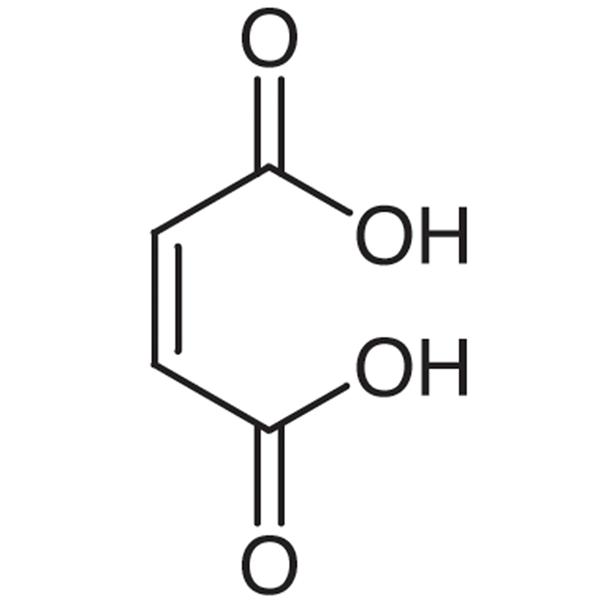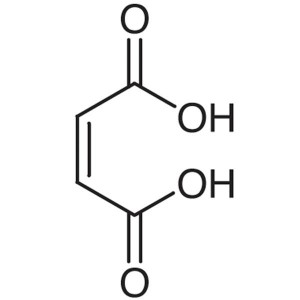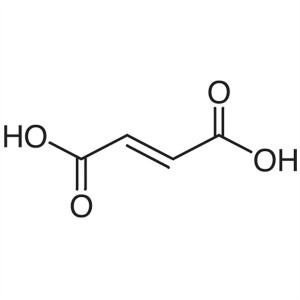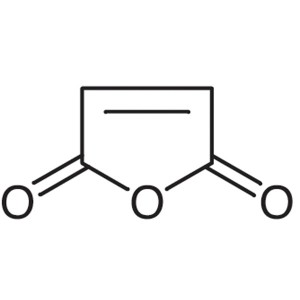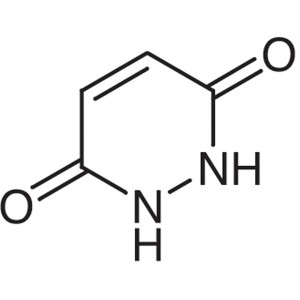Maleic Acid CAS 110-16-7 Assay 99.0%-101.0% (Titration) Factory High Purity
Ruifu Chemical is the leading manufacturer of Maleic Acid (CAS: 110-16-7) with high quality, production capacity 400 tons per month. Ruifu Chemical has been supplying Maleic Acid more than 15 years.
Ruifu Chemical can provide worldwide delivery, competitive price, excellent service.
Purchase Maleic Acid, please contact us by e-mail: alvin@ruifuchem.com
| Chemical Name | Maleic Acid |
| Synonyms | cis-2-Butenedioic Acid; cis-Butenedioic Acid; Toxilic Acid |
| Stock Status | In Stock, Production Capacity 400 Tons per Month |
| CAS Number | 110-16-7 |
| Molecular Formula | C4H4O4 |
| Molecular Weight | 116.07 g/mol |
| Melting Point | 130.0-135.0℃(lit.) |
| Boiling Point | 275℃ |
| Flash Point | 127℃(260°F) |
| Density | 1.590 g/ml at 25℃(lit.) |
| Sensitive | Light Sensitive |
| Water Solubility | Soluble in Water (780 g/l 25℃, Transparency) |
| Solubility | Soluble in Alcohol, Acetone. Insoluble in Chloroform, Benzene |
| Stability | Stable. Combustible. Incompatible with Strong Oxidizing Agents, Bases. |
| Storage Temperature | Store Long-Term in a Cool and Dry Place |
| COA & MSDS | Available |
| Sample | Available |
| Origin of Product | Shanghai, China |
| Brand | Ruifu Chemical |
| Items | Specifications | Results |
| Appearance | White Crystalline Powder | White Crystalline Powder |
| Appearance of Solution | Colorless, Clear Liquid | Pass |
| Assay / Analysis Method | 99.0%-101.0% (Titration) (Anhydrous Basis) | 100.5% |
| Fumaric Acid | ≤1.50% | 0.30% |
| Iron (Fe) | ≤5ppm | <5ppm |
| Water by Karl Fischer | ≤2.00% | 0.91% |
| Sulfated Ash | ≤0.10% | 0.06% |
| Heavy Metals (Pb) | ≤10ppm | <10ppm |
| Conclusion | The product has been tested and complies with the given specifications | |
Package: Fluorinated bottle, Aluminium foil bag, 25kg/bag, 25kg/cardboard drum, or as customer's requirement.
Storage Condition: Keep the container tightly closed. Store in a cool, dry and well-ventilated warehouse away from incompatible substances. Keep away from sunshine; avoid fire and heat sources; avoid moisture.
Shipping: Deliver to worldwide by air, by FedEx / DHL Express. Provide fast and reliable delivery.
MALEIC ACID
[110-16-7]
DEFINITION
Maleic acid contains not less than 99.0 per cent and not more than the equivalent of 101.0 per cent of (Z)-butenedioic acid, calculated with reference to the anhydrous substance.
CHARACTERS
A white or almost white, crystalline powder, freely soluble in water and in ethanol (96 per cent).
IDENTIFICATION
A. Dilute 5 mL of solution S (see Tests) to 10 mL with water R. The pH of the dilution is less than 2.
B. Examine the chromatograms obtained in the test for fumaric acid. The principal spot in the chromatogram obtained with test solution (b) is similar in position and size to the principal spot in the chromatogram obtained with reference solution (a).
C. Dissolve 0.1 g in 10 mL of water R (solution a). To 0.3 mL of solution (a) add a solution of 10 mg of resorcinol R in 3 mL of sulfuric acid R. Heat on a water-bath for 15 min; no colour develops. To 3 mL of solution (a) add 1 mL of bromine water R. Heat on a water-bath to remove the bromine (15 min), heat to boiling and cool. To 0.2 mL of this solution add a solution of 10 mg of resorcinol R in 3 mL of sulfuric acid R. Heat on a water-bath for 15 min. A violet-pink colour develops.
TESTS
Solution S. Dissolve 5.0 g in water R and dilute to 50 mL with the same solvent.
Appearance of solution. Solution S is clear (2.2.1) and not more intensely coloured than reference solution Y7 (2.2.2, Method II).
Fumaric acid. Examine by thin-layer chromatography (2.2.27), using silica gel GF254 R as the coating substance.
Test solution (a). Dissolve 0.5 g of the substance to be examined in acetone R and dilute to 5 mL with the same solvent.
Test solution (b). Dilute 1 mL of test solution (a) to 50 mL with acetone R.
Reference solution (a). Dissolve 20 mg of maleic acid CRS in acetone R and dilute to 10 mL with the same solvent.
Reference solution (b). Dissolve 15 mg of fumaric acid CRS in acetone R and dilute to 10 mL with the same solvent.
Reference solution (c). Mix 5 mL of reference solution (a) and 5 mL of reference solution (b).
Apply separately to the plate 5 μL of test solutions (a) and (b), 5 μL of reference solutions (a) and (b) and 10 μL of reference solution (c). Develop in an unsaturated tank over a path of 10 cm using a mixture of 12 volumes of anhydrous formic acid R, 16 volumes of chloroform R, 32 volumes of butanol R and 44 volumes of heptane R. Dry the plate at 100℃ for 15 min and examine in ultraviolet light at 254 nm. Any spot corresponding to fumaric acid in the chromatogram obtained with test solution (a) is not more intense than the spot in the chromatogram obtained with reference solution (b) (1.5 percent). The test is not valid unless the chromatogram obtained with reference solution (c) shows two clearly separated spots. Iron. To 10 mL of solution S add 2 mL of dilute hydrochloric acid R and 0.05 mL of bromine water R. After 5 min, remove the excess of bromine by passing a current of air and add 3 mL of potassium thiocyanate solution R. Shake. Prepare a standard at the same time and in the same manner, using a mixture of 5 mL of iron standard solution (1 ppm Fe) R, 1 mL of dilute hydrochloric acid R, 6 mL of water R and 0.05 mL of bromine water R. Allow both solutions to stand for 5 min. Any red colour in the test solution is not more intense than that in the standard (5 ppm).
Water (2.5.12). Not more than 2.0 per cent, determined on 1.00 g by the semi-micro determination of water.
Sulfated ash (2.4.14). Not more than 0.1 per cent, determined on 1.0 g.
ASSAY
Dissolve 0.500 g in 50 mL of water R. Titrate with 1 M sodium hydroxide using 0.5 mL of phenolphthalein solution R as indicator.
1 mL of 1 M sodium hydroxide is equivalent to 58.04 mg of C4H4O4.
STORAGE Store in a glass container, protected from light
How to Purchase? Please contact Dr. Alvin Huang: sales@ruifuchem.com or alvin@ruifuchem.com
15 Years Experience? We have more than 15 years of experience in the manufacture and export of a wide range of high quality pharmaceutical intermediates or fine chemicals.
Main Markets? Sell to domestic market, North America, Europe, India, Korea, Japanese, Australia, etc.
Advantages? Superior quality, affordable price, professional services and technical support, fast delivery.
Quality Assurance? Strict quality control system. Professional equipment for analysis include NMR, LC-MS, GC, HPLC, ICP-MS, UV, IR, OR, K.F, ROI, LOD, MP, Clarity, Solubility, Microbial limit test, etc.
Samples? Most products provide free samples for quality evaluation, shipping cost should be paid by customers.
Factory Audit? Factory audit welcome. Please make an appointment in advance.
MOQ? No MOQ. Small order is acceptable.
Delivery Time? If within stock, three days delivery guaranteed.
Transportation? By Express (FedEx, DHL), by Air, by Sea.
Documents? After sales service: COA, MOA, ROS, MSDS, etc. can be provided.
Custom Synthesis? Can provide custom synthesis services to best fit your research needs.
Payment Terms? Proforma invoice will be sent first after confirmation of order, enclosed our bank information. Payment by T/T (Telex Transfer), PayPal, Western Union, etc.
Hazard Symbols Xn - Harmful
Risk Codes
R22 - Harmful if swallowed
R36/37/38 - Irritating to eyes, respiratory system and skin.
R43 - May cause sensitization by skin contact
Safety Description
S26 - In case of contact with eyes, rinse immediately with plenty of water and seek medical advice.
S28 - After contact with skin, wash immediately with plenty of soap-suds.
S37 - Wear suitable gloves.
S28A -
S46 - If swallowed, seek medical advice immediately and show this container or label.
S24 - Avoid contact with skin.
UN IDs 3261
WGK Germany 1
RTECS OM9625000
TSCA Yes
HS Code 2917 3990.90
Hazard Class 8
Packing Group III
Maleic Acid (CAS: 110-16-7) is a dicarboxylic acid, that is, an organic compound containing two carboxylic acid functional groups. Maleic Acid and Fumaric Acid are cis-trans isomers. Maleic Acid is often used to prepare Fumaric Acid. The anhydride of Maleic Acid is Maleic Anhydride.
Maleic Acid is used in the production of many products, including Fumaric Acid, unsaturated polyester resins, plastics, adhesives, paint, coatings, and lubricants. It is also used in the production of pharmaceuticals, pesticides, food additives, and other chemicals.

